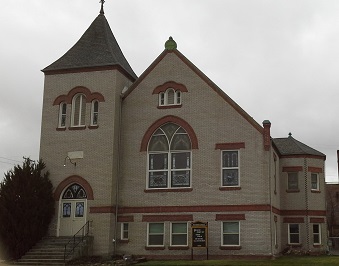Many took to the streets to protest the not-guilty verdict in the trial of George Zimmerman, but many also went to their houses of worship to find peace and seek answers.
Bishop Ken Carter, Episcopal leader of the Florida Annual (regional) Conference, sent a letter to the pastor and people of First United Methodist Church, Sanford, Fla., saying he was praying for peace for them but also encouraging the congregation to be a sign of God’s grace and peace in the days ahead.
On Feb. 26, 2012, Trayvon Martin, an unarmed 17-year-old, was shot and killed by a member of a neighborhood watch in Sanford, Fla. The shooter, George Zimmerman, a 28-year-old Hispanic, said he shot the teen in self-defense. A jury on July 13 found Zimmerman not guilty after deliberating for more than 15 hours.
“This is a teachable moment, and we dare not waste it,” Carter said.
“Beyond the civic conversation, United Methodists are called to reflect on what this means for disciples of Jesus Christ who are called to transform the world.”
Pray ‘we will help guide conversation’
The victims are many and the conversation on race has grown because of this case, said Bishop Minerva Carcaño, who leads the California-Pacific Annual (regional) Conference and is president of the United Methodist Commission on Religion and Race.
“I pray that as persons of Christian faith we will help guide the conversation in thoughtful and prayerful ways. The life of a young man has been cut short. His family and closest friends will live with a hole in their hearts. A man has taken a life and will live with that burden the rest of his life. Racism, guns, violence, and the lack of security plague us all,” she said in a statement.
Pastors like the Rev. Doug Cunningham of New Day United Methodist Church in Bronx, New York, worked into the early morning to refocus his sermon and worship service on the outcome of the racially charged trial.
On his Facebook page he wrote: “We can’t preach peace when there is no peace.”
“There is a lot of hurt, and there were a lot of tears,” said Melissa Hinnen, student intern pastor at New Day. Members of New Day participated in a rally and march from Union Square to Times Square Sunday night.
Not guilty also ‘not innocent’
Bishop Mike Coyner, Indiana Annual (regional) Conference, said it is important to remember that being found not guilty is not the same as being found innocent.
“George Zimmerman is not innocent of the death of Trayvon. Moreover, our whole culture is not innocent of this sad situation. … All of us bear some responsibility for creating or allowing a culture of violence, suspicion, racism, crime, and tragedy to exist in our nation. The multiple murders in Indianapolis in recent weeks are a reminder that the Zimmerman case is not unique — such violence is everywhere, and the problems between whites, Hispanics and African Americans seem to be growing,” he said in an E-pistle.
Kathryn Lohre, president of the National Council of Churches, said that in the wake of the acquittal, people of faith should join in a renewed call for racial justice.
“The day after the shooting death of Trayvon Martin, we, acknowledged ‘the tragic reality that exists for young men of color and their families who, because of their appearance, fear they will be victims of violence at the hands of police and others.’ As we seek to honor the memory of Trayvon Martin, we are called to action to protect the lives of all from fear, violence, racism and injustice,” Lohre said.
Bishop Sudarshana Devadhar, New England Annual (regional) Conference, also called for peace and a nonviolent spirit.
“It may take much prayer for God to give this kind of strength to us and to all those who feel deep anger, shock, and betrayal in this time,” he said.
“In the face of such oppression, there is a temptation to become disengaged,” said the Rev. Theon Johnson III, co-chair of United Methodists of Color for a Fully Inclusive Church. “We as the Church must advance the dialogue. We will move forward from this experience. How we move forward, however, will be determined by our willingness to show up and announce justice.”
The Rev. Pamela Lightsey of Boston School of Theology said, “you can’t lose what you never had” to the question of whether black Americans have lost faith in the justice system after the acquittal of George Zimmerman.
“So, to put this question to a grieving family, ‘Have you lost faith in the justice system?’ demonstrates an ignorance of the tragic history of slavery, civil rights, legal racial profiling and now Stand Your Ground laws. One simply cannot lose what has never been. The more sensitive question should be: What can we all do to ensure a legal system that ensures justice for all citizens and residents in our country?”
Visible signs of peace
Carter said he is encouraging the congregations in the Florida conference to reflect diversity, to question more publicly the “Stand Your Ground” law of the state of Florida. In Florida, as in more than 20 other states, a “Stand Your Ground” law provides significant leeway for using deadly force if a person feels threatened.
“I am praying for people of The United Methodist Church in Sanford. I am praying that they will be an outward and visible sign of God’s peace, justice, reconciliation and healing in the days ahead. I am praying that they, and we, do not waste this teachable moment. “
Kathy Gilbert is a multimedia reporter for the young adult content team at United Methodist Communications, Nashville, Tenn. Contact her at (615) 742-5470 ornewsdesk@umcom.org.

No comments:
Post a Comment